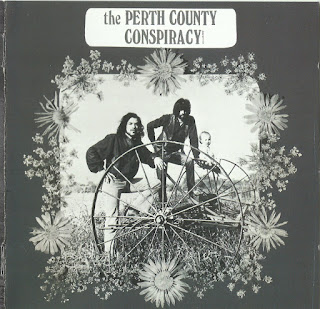Taking their name from the Stratford, Ontario region of the same name, Perty County Conspiracy was centred around British immigrant Cedric Smith and American draft dodger Richard Keelan (ex of Spikedrivers). They gigged up and down the Toronto strip in the late '60s and released their debut album, Mushroom Music on the independent label, Rumour Records in '69.
A healthy dose of trippy acid/folk rock was served up, and thanks to the CBC, it was followed in the spring of 1970 with a self-titled promotional only album. By now guitarist Terry Jones, bassist Michael Butler, and George Taros on piano were added. Only 250 copies were pressed, and although mostly experimental folk with the occasional mandolin or ukelele and bongo drums, it also contained covers of Donovan's "Hurdy Gurdy Man" and Dylan's "I Shall Be Released," and a folksy cover of Smokey Robinson's "If You Can Wait." But the music wasn't very audibly accessible, and the record was soon forgotten about by the radio station programmers.
Still, it fuelled them on to continue playing, and they eventually caught the attention of reps at Columbia. They were a hit with the live crowds and Perth County Conspiracy Does Not Exist was on the store shelves before the end of the year.
Nothing from the first two albums was re-recorded, and instead 40 minutes of new acoustic melodies with the occasional vocal harmonies made up the bulk of the John Williams produced album. "You've Got To Know" b/w "Listen To The Kids" was released as a single, but never really caught on. A few years later, the b-side did however make it to the Maple Music compilation series. The album also featured sampling from Shakespeare's "As You Like It," and a couple of endeavors that contained multiple segments, including the single "Fantasia" b/w "Listen To The Kids." Met with little fanfare, it was followed by "You've Got To Know" b/w "Keep of the Keys," and also featured an interpretation of English poet Christopher Logue's "Come To The Edge."
Recorded in the Bathhurst Street United Church in Toronto, their next outing was 1971's double album, Alive, with Williams returning as producer. Oddly, it was all new material, and Jones contributed to the writing this time. An edited cover of Dylan's "You Ain't Got Nothing" was put out as a single. But as usual, it didn't light the radio waves on fire. Other noteable cuts included the b-side "Uncle Jed," "Broken Wing," and the reflective "Stratford People."
Columbia dropped them by '72 but undaunted, the band carried on and eventually Bob Burchill came in on guitars to replace the departed Terry Jones. Now back on Rumour Records, they released another live album, What School Bus Tour? in the summer of '73. The band wasn't known for extensive engagements, but the record was a culmination of performances in Ottawa, Sudbury, and Winnipeg earlier that year. It again featured all new material, and Burchill's presence was immediately seen in the credits writing three cuts. It also featured a rendition of Arlo Guthrie's "Pastures of Plenty," and a pair of tracks written by Milton Acorn.
Following the stand alone single, "Black Creek" in '74, their next album wasn't until a year later. Breakout To Berlin again featured all new material, and a German pressing with a different cover and under the title of Kanada was released.
Following the band's demise, Burchill released the ill-fated Cabin Fever on Rumour Records in late '75, then became a session player. Smith carried along on the Toronto scene for awhile, and hooked up with Terry Jones again for the album, Ten Lost Years And Then Some in '77, then made it on to a CBC compilation in '81 called Touch The Earth before turning to acting. Along with regular roles in the series Road To Avonlea and Anne of Green Gables, he also landed a spot in the X-Men franchise.
What School Bus Tour and Ten Lost Years were both released individually in 2008, but neither contained any bonus material. In the early '90s, band members started reuniting annually a coffee house in Stratford in support of the homeless. In 2011, the band's name was resurrected again when CBC Radio profiled them during its "Inside The Music" series.
by Michelle Dionne, Dawn Edwards, Jaimie Vernon
A true legend of the psych-folk rock genre, the very first album by Canadian band Perth County Conspiracy was conceived, recorded and designed to look and sound like the product of a commercial record label. But with only 250 copies produced the record quickly reached mythic status as the band went on to begin a commercial career with Columbia Records.
A huge influence on later generations of Canadian artists, original copies are incredibly rare and change hands for hundreds of dollars. Defining the zeitgeist as the 60s became the 70s, the band sound has touches of Nick Drake, Donovan and Terry Reid as well as more acid folk influences. Standout tracks include a version of Donovan’s ‘Hurdy Gurdy Man’, the trippy ‘Take Your Time’ and the smokey flute-led ‘So Many Things’.
Tracks
1. Welcome Surprise (Richard Keelan) - 3:13
2. Take Your Time (Richard Keelan, Cedric Smith) - 3:23
3. If You Can Want (Smokey Robinson) - 4:31
4. Woman For All Seasons (Cedric Smith) - 4:15
5. Hurdy-Gurdy Man (Donovan Leitch) - 4:37
6. Mr Truthful Licks (Richard Keelan) - 2:49
7. So Many Things (Cedric Smith) - 2:53
8. Hindsight (Richard Keelan) - 3:41
9. Lace And Cobwebs (Cedric Smith) - 2:43
10.I Shall Be Released (Bob Dylan) - 6:35
Perth County Conspiracy
*Michael Butler - Bass
*Richard Keelan - Vocals, Guitar
*Cedric Smith - Vocals, Guitar
*Terry Jones - Vocals, Guitar
1970 Perth County Conspiracy - Does Not Exist (Vinyl edition)
1972 Perth County Conspiracy - Alive (Vinyl edition)
Related Act
1965-68 The Spike Drivers - 60's Folkrocking Psychedelia From The Motor City
Free Text
the Free Text





























